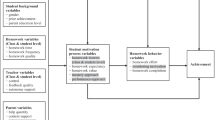Abstract
Recent studies have questioned whether the nation's educational system is adequately preparing children to function productively in today's society. To examine this issue, the present study utilized the Experience Sampling Method to investigate the amount of time young adolescents spent doing classwork and homework, their inner subjective experience while doing so, and their companions while doing homework. The relationship between these variables and students' academic performance was also examined. Results revealed that students spent only 15.5 hours per week engaged in school work and only 6 hours per week doing homework, with increased homework time associated with better academic achievement. In addition, students were found to complete homework primarily alone or in classes, although doing homework with their parents was associated with better academic performance. Lastly, students' affect was found to be relatively neutral when doing classwork, but comparatively more negative while doing homework, particularly when doing homework alone. The implications of these findings for understanding the socializing influence of school are discussed.
Similar content being viewed by others
References
Csikszentmihalyi, M., and Larson, R. (1984).Being Adolescent. Basic Books, New York.
Csikszentmihalyi, M., and Larson, R. (1987). The experience sampling method.J. Nervous Mental Dis. 175: 526–536.
Gilligan, C. (1982).In a Different Voice. Harvard University Press, Cambridge.
Japanese Finance Ministry. (1980).White Paper on Adolescence. Printing Office, Tokyo.
Karweit, N. (1984). Time on task reconsidered: Synthesis of research on time and learning.Educat. Leader. 41: 32–35.
Keith, T. Z., and Page, E. B. (1985). Homework works at school: National evidence for policy changes.School Psychol. Review 14: 351–359.
Leone, C. (1989).Family Variables, Subjective States, and Academic Performance in Young Adolescence. Unpublished doctoral dissertation, Loyola University of Chicago, Chicago, IL.
Loether, H., and McTavish, D. (1974).Inferential Statistics for Sociologists. Allyn & Bacon, Boston.
McDermott, R. P., Goldman, S. V., and Varenne, H. (1984). When school goes home: Some problems in the organization of homework.Teachers College Rec. 85: 391–409.
McGraw-Hill, Inc. (1982).Comprehensive Test of Basic Skills. McGraw-Hill, Monterey, CA.
McIntyre, D. J., Copenhaver, R. W., Byrd, D. M., and Norris, W. R. (1983). A study of engaged student behavior within classroom activities during mathematics class.J. Educat. Res. 77: 55–59.
National Commission on Excellence in Education. (1983).A Nation at Risk: The Imperative for National Reform. US Government Printing Office, Washington, DC.
Paschal, R. A., Weinstein, T., and Wahlberg, H. J. (1984). J. Educat. Res. 78: 97–104.
Patton, J. E., Stinard, T. A., and Routh, D. K. (1983). Where do children study?J. Educat. Res. 76: 280–286.
Sanford, J. P., and Evertson, C. M. (1983). Time use and activities in junior high classes.J. Educat. Res. 76: 140–147.
Science Research Associates. (1985).SRA Survey of Basic Skills. Science Research Associates, CA.
Stevenson, H. W., Lee, S., and Stigler, J. W. (1986). Mathematics achievement of Chinese, Japanese, and American children.Science 231: 693–699.
Thorndike, R. L. (1963).The Concepts of Over- and Under-Achievement. Columbia University Teacher's College Bureau of Publications, New York.
Timmer, S. G., Eccles, J., and O'Brien, K. (1985). How children use time. In Juster, F. T. and Stafford, F. P. (eds.),Time, Goods, & Well-Being. Institute for Social Research, University of Michigan, Ann Arbor.
Ugurolglu, M., and Wahlberg, H. (1979). Motivation and achievement: A quantitative synthesis.Ame. Educat. Res. J. 16: 375–389.
Wahlberg, H. J., and Frederick, W. C. (1982). Instructional time and learning. Encyclopedia of Educational Research, 2, 917–924.
Yule, W. (1973). Differential prognosis of reading backwardness and specific reading retardation.British Journal of Educational Psychology, 43, 244–248.
Zuzanek, J. (1980).Work and Leisure in the Soviet Union: A Time-Budget Analysis. Praeger, New York.
Author information
Authors and Affiliations
Additional information
This research was supported by NIMH grant number MH38324, “Stress in Daily Life During Early Adolescence,” awarded to Reed Larson. This paper was prepared while the first author was a Schmitt Dissertation Fellow at Loyola University of Chicago.
Received her Ph.D. from Loyola University of Chicago, Current Research interest are familial and intrapsychic influences on adolescents' academic performance.
Current Research interests are pubertal development, precursors of eating disorders, and the effect of maternal employment on young adolescents.
Rights and permissions
About this article
Cite this article
Leone, C.M., Richards, H. Classwork and homework in early adolescence: The ecology of achievement. J Youth Adolescence 18, 531–548 (1989). https://doi.org/10.1007/BF02139072
Issue Date:
DOI: https://doi.org/10.1007/BF02139072




